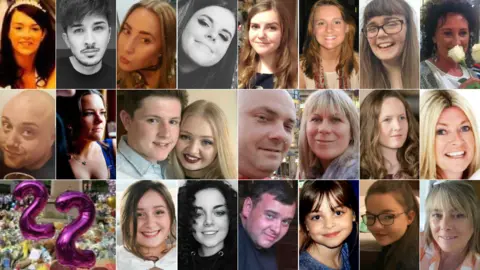Manchester Arena Inquiry: Fire control room staff 'overlooked' in training
 Manchester Arena Inquiry
Manchester Arena InquiryFire control room staff were not invited to take part in terror attack training before the Manchester Arena bombing, an inquiry has heard.
North West Fire Control's (NWFC) Michelle Gregson told the Manchester Arena Inquiry her colleagues were "overlooked" during training in 2016.
The team leader said not being invited to the exercise was "extraordinary".
She added that there had been "no recognition" that such incidents began with a call to the control room.
The inquiry has been looking at the emergency response to the bombing of the venue on 22 May 2017, which killed 22 people and injured hundreds more.
It heard that in May 2016, an exercise codenamed Winchester Accord took place at the Trafford Centre shopping mall, which tested the emergency services' ability to deal with a marauding terrorist.
The inquiry has been told the exercise identified a number of concerns, including the inability of other emergency services to contact Greater Manchester Police's Force Duty Officer (FDO), the initial commander of any such incident.
On the night of the bombing, that issue resulted in a two-and-a-half hour delay in Greater Manchester Fire and Rescue Service (GMFRS) sending any resources.
'None the wiser'
Asked about control room staff's involvement in the exercise, Ms Gregson said her colleagues had "never been invited to participate in any joint-agency... exercise, [which] is extraordinary".
"It seems to me that the control room is overlooked in these types of exercise [and is] almost an afterthought," she said.
"There is no recognition that almost every single incident starts with a phone call to a control room."
 Family handouts
Family handoutsThe hearing was then told that 10 minutes after the bombing, Ms Gregson told station manager Andy Berry that police had nominated a meeting point for emergency services outside Manchester Cathedral car park, but Mr Berry decided to muster at Philips Park fire station to the east of the city instead.
Ms Gregson said that one of the things she had "really struggled with is that I don't have any local knowledge of Manchester".
"I have heard so many times 'why did appliances drive away from an incident?'
"I didn't know they were going further away, because I don't know where Philips Park is."
She said NWFC was formed to bring Greater Manchester, Lancashire, Cumbria and Cheshire fire services under one control room and improve working practices, but said that had not happened and the four services were now "probably further apart".
Ms Gregson said she had felt "none the wiser" after the conversation with Mr Berry and agreed with the assertion that there was "no plan B" if the contact between emergency services did not take place quickly.
She said the scene in the control room that night was "absolute bedlam" and "unprecedented" and she had not had the time to review logs, which noted the police and ambulance service had already mobilised to the venue.
Sharing that information with senior fire officers may have led to different deployment decisions, she added.
The inquiry continues.

Why not follow BBC North West on Facebook, Twitter and Instagram? You can also send story ideas to [email protected]
